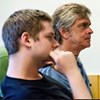hunting

Creating happy animals in order to eat them: Jeff McMahan and Tim Campbell
In recent debates about the ethics of eating animals, some have advanced the claim that if people cause animals to exist and give them good lives in order to be able to eat them, then even if the anim
The Future of Work: Augmentation or Stunting?
Philosophy & Technology 36 Abstract The last decade has seen significant improvements in artificial intelligence (AI) technologies, including robotics, machine vision, speech recognition, and text ge
How do we measure well-being?
Stella lives with her family in a villa in a medium-sized town in Sweden. She likes her job but her back is hurting. How do we measure her well-being? Increasing well-being is generally accepted as one
Putting the person in to the particle
Report on seminar 'Modelling Social Mechanisms for Knowledge Generation & Exploration' by Nanda Wijermans (Stockholm Resilience Centre) Over the last decade physicists have developed “social force”
Putting costs and benefits of ordeals together
Economics and Philosophy 37 Abstract This paper addresses how to think about the permissibility of introducing deadweight costs (so-called ‘ordeals’) on candidate recipients of goods in order to attain b
Still heating: Unfolding a typology of climate obstruction
In N. Marschner, C. Richter, J. Patz, & A. Salheiser (Eds.), Contested climate justice – Challenged democracy: International perspectives (pp. 59-71). Campus Verlag GmbH Abstract Earth is on a catastryet, there is little sign of halting the rise of global greenhouse gas emissions orstopping the extraction of fossil fuels. Against this background, in this articlewe re-engage with a recently proposed typology supposed to cover three modesthrough which effective climate action has been obstructed. These are, first,primary obstruction, that is, the spread of disinformation and/or denying the veryexistence of anthropogenic climate change. Second, secondary obstruction concernsmore or less deliberate obstruction via opposition to climate action and policiesvia, for example, reference to “the threat of deindustrialisation”. Finally, tertiaryobstruction denotes modes of living which, while not necessarily obstructingeffective climate change intentionally, concerns “living in denial”. Drawing onrecent research and examples, we revisit this typology.
Climate Obstruction - How Denial, Delay and Inaction are Heating the Planet
Routledge, 156 p. InClimate Obstruction: How Denial, Delay and Inaction are Heating the Planet, Kristoffer Ekberg, Bernhard Forchtner, Martin Hultman and Kirsti Jylhä bring together crucial insights fr
Funding received for research projects about democracy and equality
Last week the institute was granted 8 million SEK by the Wallenberg Foundations for two research projects that will go on for four years. The boundary problem in democratic theory. Gustaf Arrhenius was g
Changing local customs: The long run impacts of Christian missions on female genital cutting in Africa
Journal of Development Economics 166 (2024) Abstract We investigate the long-run impacts of Christian missions on female genital cutting (FGC) in Africa. Our empirical analysis draws on historical data o








